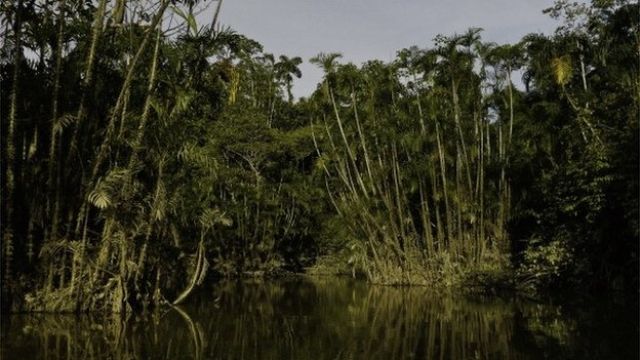
Ecuadorian President Rafael Correa’s decision to drill for oil in the ITT block of Yasuni National Park looks set to be reviewed at a referendum. Environmental groups delivered hundreds of thousands of signatures to the National Electoral Commission on 11–12 April petitioning against the decision.
United for Yasuni (Yasunidos) collected 856,704 signatures. Kichwa indigenous federation Ecuarunari delivered more than 200,000 and Amazon Total Defence Front (FDTA) provided 584,008.
These contributions easily surpassed the 583,324 signatures required to force a referendum under Ecuador’s 2008 constitution.
Correa was first elected in 2006 on a platform to lead a “citizens' revolution”, of which a key component was a new constitution to extend democratic and social rights. An elected Constituent Assembly drafted the new constitution, which was adopted by referendum.
Under the new constitution, government decisions can be taken to a referendum if at least 5% of the country’s voters sign a petition challenging a decision.
All Ecuadorian citizens over the age of 16, including ex-pats as well as most foreign residents in Ecuador, are eligible to vote.
For changes to articles in the Constitution, at least 8% of voters must sign a petition. A Constituent Assembly can be called with 12% of voters and a referendum on removing the President can be called with a petition signed by 15% of voters.
Yasuni-ITT Initiative
The Yasuni-ITT Initiative was announced in 2007. In an innovative move to combine environmental concerns with Ecuador’s need for revenue to tackle poverty, the Correa government proposed a deal to leave the ITT block’s approximately 846 million barrels of oil under the ground.
By not extracting the oil, an estimated 407 million tonnes of carbon dioxide emissions would be avoided. In exchange, the government asked for US$3.6 billion from the international community, equivalent to 50% of expected state income from exploiting the oil.
The initiative was justified on the grounds of the “climate debt” of the industrialised countries, which had developed their economies via environmentally destructive practices that are the main cause of global warming.
In August last year, Correa announced that the initiative would be scrapped. In six years, only $13 million had been pledged, amounting to just 0.37% of the original request.
“With profound sadness, but also with absolute responsibility for our people and history, I have had to make one of the most difficult decisions of my time in government,” said Correa in making his announcement.
In justifying the decision, Correa noted that only half of all Ecuadorians have access to running water and sewage systems.
“Let’s not be misled,” Correa said. “We need our natural resources to be able to break away from poverty as quickly as possible, and for development that is sovereign and independent.”
“Besides, poverty also damages the environment, via the over-exploitation of topsoils, the illegal felling of forests, and the pollution caused by untreated stormwater and sewage.”
Of the forecast income from ITT petroleum, more than $2 billion has been promised to the Amazonian provincial governments for basic infrastructure.
Supporting the referendum
In campaigning for a referendum, Yasunidos and Ecuarunari put forward the question: “Do you agree with the Ecuadorian government leaving the crude in ITT, known as Block 43, under the ground indefinitely?’
The proposal is part of long-standing campaigns from many indigenous groups and environmentalists in Ecuador for a lower-intensity development with minimal exploitation of natural resources. This culminated in the provisions in the constitution to recognise the rights of nature and enshrine Buen Vivir (“Good Living”) as the prime goal of the Ecuadorian state.
However, since 2008, Correa has pursued a development program focused on economic sovereignty, developing infrastructure, and redistributing omining and oil revenue.
Correa has been Latin America’s most popular president for the past several years, with approval ratings of about 80%. One source of opposition to his administration has stemmed from the conflict between Buen Vivir and a more mainstream development model.
These differences have been opportunistically amplified by right-wing forces, particularly the local corporate media as well as the US press.
El Comercio, a newspaper which has been a pillar of the Ecuadorian elite over its 108-year history, distributed the FDTA’s petition.
The petition asked: “Are you in agreement with declaring Ecuador free of all extractive activities; and, in general, free of projects that affect Pachamama and environmental patrimony, such as hydrocarbon and mining projects, among others?”
It is hard to grasp what this implies, given that Pachamama is a Kichwa concept that combines “mama”, (meaning mother) and “Pacha”, meaning loosely “the spiral-structured space-time universe”. That is a difficult thing to not “affect”.
The front cover of the brochure containing the FDTA petition featured bizarre slogans. “Our country should remain intact and natural. No more oil! No more hydroelectricity! No more wind farms!”
Opposing hydroelectricity, in particular, is an incredibly impractical proposal in Ecuador. It is a nation of huge mountains and high rainfall where two-thirds of the electricity is generated by hydro-electricity plants.
What is even stranger than this kind of environmentalism is its support by a corporate paper with historic links to the banking industry.
In an interview with Democracy Now! in September last year, Ecuador's foreign minster Ricardo Patino expressed regret the Correa government's initiative to leave the oil in the ground had failed, but said it was working to minimise environmental destruction.
“After having appealed and appealed, Ecuador decided to exploit the oil without affecting the surface of Yasuni; this is very important,” Patino said. “It will have some impact, but it will be minimal.”
The upcoming Yasuni referendum will be another opportunity for disjointed opposition groups to seek to find a way to undermine the Correa government’s mandate.
